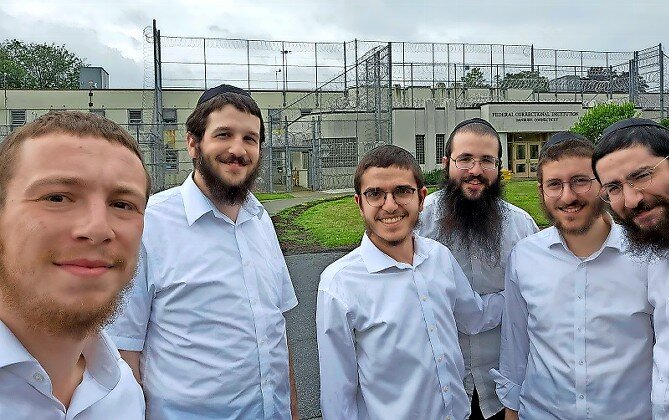Jailed Jews understand meaning of Yom Kippur
“The One who answered Joseph in jail, He will answer us.” So reads one of several imprisonment references in Yom Kippur prayers, in line with the themes of judgment and atonement of the High Holiday.
Spending hours in synagogue on Yom Kippur — the 25-hour-fast that this year begins Sunday evening — can feel like involuntary confinement. But many Jews know literally what it is like to spend the High Holidays in prison.
Rabbis associated with the more than 40-year-old Florida-based Aleph Institute will visit Jewish inmates ahead of this Yom Kippur, as some have done for many years.
In addition to serving Jewish inmates and their families, the institute assists US military personnel and those who are institutionalized or at risk for incarceration due to mental illness or addiction, as well as their family members.
Mendy Katz, a Chabad rabbi and the institute’s Miami-based director of outreach programs, told JNS that he has visited prisoners around Yom Kippur for nearly three decades.
“Everyone in prison feels the heavy load of justice and understands what it means to be judged and to be sentenced,” Katz said. “They also understand the concepts of compassion, repentance and forgiveness.”
High Holiday central themes are “very consistent with what incarcerated individuals go through on a daily basis,” he added. “It’s pretty easy to talk about the themes of Yom Kippur with them.”
Some prisoners are very remorseful, while others are less so, in Katz’s experience. “Everyone is different,” he said.
Yisroel Baumgarten, a rabbi who works at Chabad Young Professionals in Brooklyn, began visiting prisons as an Aleph Institute volunteer before Yom Kippur two years ago.
“What makes me go back is seeing the appreciation that the prisoners have for the visits and how much it means for them,” he said. “There was a fellow we visited this summer who said we were the only visitors he’s had in years.”
“It’s just raw emotions when you’re there,” Baumgarten added. “You really see the appreciation.”
Sholom Lipskar, a Chabad rabbi and founder of the Shul of Bal Harbour in Surfside, Florida, told JNS that he was encouraged to created the Aleph Institute in 1981 by the Rebbe, the late Rabbi Menachem Mendel Schneerson. At the time, no one was addressing the needs of those in a limited environment, Rabbi Lipskar said. “They didn’t have access to all the spiritual needs that are critical for their lives and in particular their families, so we successfully filled that void.”
The institute serves those of all backgrounds and faiths, who need not be Jewish. “It’s a Jewish-run program that addresses all needs for Jewish people,” he said. “We also address the needs for the general community that are deemed necessary.”
Rabbi Lipskar, whom the Rebbe sent as an emissary with his wife, Chana, to South Florida in the late 1960s, also founded the Chabad synagogue in Surfside in 1981. The shul’s current building, which recently underwent a $20 million renovation, turns 30 next year.
In 2009, Newsweek named the shul one of the 25 most vibrant congregations in America, saying that it is “one of the country’s most unorthodox Orthodox synagogues,” which reaches out “to Miami’s diverse Jewish population.”
What started with a handful of congregants and one weekly class is now a community of more than 3,000 people, including 800 families, and 50 classes are offered weekly, according to Rabbi Lipskar.
In June 2021, hundreds of volunteers prepared supplies at the shul following the collapse of the nearby Champlain Towers South condominium, where 98 people were killed. The shul served as a command center for weeks, helping to bolster first responders as well.
The community “participated in any way financially to make sure the rescuers had the proper food 24/7 and that everything was done at the highest level,” Rabbi Lipskar told JNS.

 53.0°,
Mostly Cloudy
53.0°,
Mostly Cloudy 




